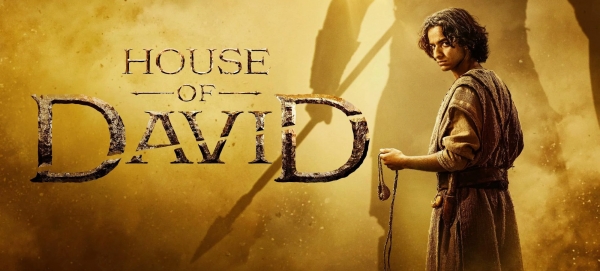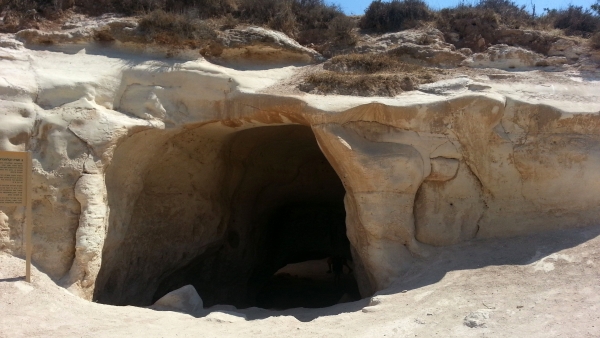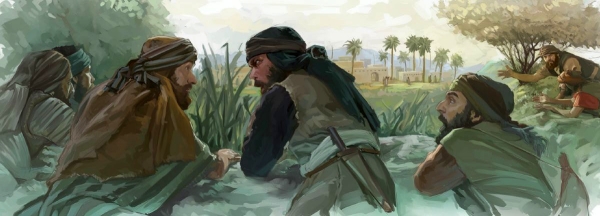SOZO - Free from Sin
March 9, 2025Pastor Patrick presented today's message, "SOZO - Free from Sin." A video of today's message is here on YouTube.
The Greek word for stronghold in 2 Corinthians 10:4 is ochuróma (ὀχύρωμα). The equivalent Old Testament Hebrew word is meh-tashd' (מְצַד). The latter's fundamental meaning is fastness, as in "to hold fast." One of the references in the Old Testament where David uses a stronghold is 1 Samuel 23:14, "David stayed in the wilderness strongholds and in the hills of the Desert of Ziph. Day after day Saul searched for him, but God did not give David into his hands." See the Bonus below: House of David (TV series).
Where I'm about to go will seem contrarian in light of today's message. It is not meant to be anything like that. Patrick's message was entirely about being set free from "destructive behaviors within us." Where my head went was looking at freedom from the things of the world, things outside of us. It's just totally different, not contrary. Back in 2022, if you're interested, I did talk a bit about what Patrick was talking about today: Limitless - Freed.
We can never be free of the things outside of us. Reality is brutal. It's what smacks you upside the head when your beliefs are wrong.
We can never be free of the laws of nature. You jump off a high cliff or building and you're going to be seriously hurt or even killed. You can never be free of the consequences of your actions and speech. And in some cases, you can't even "fix" the results of your actions or speech (e.g. ruining or spoiling someone's reputation; it just can't be taken back once "released into the wild").
The good news is that all these external laws or truths are God given. In His wisdom, He created the world and how it operates. The only wild card is free will for each of us. Each of us is free to choose what we say, what we do, how we treat others, who we follow, everything. This came up, in a way, during our Life Group discussion: what does it mean or feel like to be free? One answer was that you were freed from overly worrying about external things. You can trust in God to take care of those things eventually. Learn what God wants of you and do that; and "don't sweat the other things." But that's the big trick, too. You've got to learn what God wants of you! The Bible is a great resource for that.
Even "facts" of the science kind evolve over time. Newtonian physics gave way to relativity. An Earth-centered solar system gave way to a Sun-centered solar system. With advances moving as fast as they are today, it's very hard to keep up. Mankind's understanding of the limits of big and little have greatly expanded over time. There's not much more you can do but stay on your toes. Test, check, review, prove, examine, verify, process as best you can. Carefully listen to any reasonable voice. Credentials are a clue, but not a sure thing.
Perhaps the afterlife offers freedom from every worry or concern, inside or out. We'll either all find out, or it won't matter.
Here's an article about truth: Why Does Truth Matter: The Impact on Society and Personal Integrity.
Bonus
House of David (TV Series)

I just started watching a relatively new TV series on Amazon Prime: Wikipedia: House of David. So far, so good.
From the above-referenced Wikipedia entry, "The series premiered on February 27, 2025, with the first three episodes released on Amazon Prime Video, followed by weekly episodes until April 3, 2025. It received praise for its production values and faithfulness to the biblical narrative, but mixed reviews for its characterization. The series gives warning that some stories have been dramatized for entertainment purposes. It is encouraged to review Biblical text while watching due to the vast discrepancies in the show."
The story of David is covered in 1st and 2nd Samuel and 1st and 2nd Chronicles in the Old Testament. He's also mentioned elsewhere, and it's also worth pointing out that David wrote about half of the Psalms.
One of David's significant achievements was establishing God's earthly headquarters in Jerusalem; a stronghold, you might say.
In this morning's message, Patrick mentioned that David "hid in strongholds" - caves. I've seen caves in this series.

Cave at Adullam (possibly used by David to hide from King Saul)
Bonus2
Fear, Faith, and Miracles

After the spies had given their report to the Israelites about what they saw in Canaan, the Israelites panicked, saying (Numbers 14:1-10, NEV):
"Then all the community raised a loud cry, and the people wept that night. And all the Israelites murmured against Moses and Aaron, and the whole congregation said to them, 'If only we had died in the land of Egypt, or if only we had perished in this wilderness! Why has the Lord brought us into this land only to be killed by the sword, that our wives and our children should become plunder? Wouldn't it be better for us to return to Egypt?' So they said to one another, 'Let’s appoint a leader and return to Egypt.' Then Moses and Aaron fell down with their faces to the ground before the whole assembled community of the Israelites. And Joshua son of Nun and Caleb son of Jephunneh, two of those who had investigated the land, tore their garments. They said to the whole community of the Israelites, 'The land we passed through to investigate is an exceedingly good land. If the Lord delights in us, then he will bring us into this land and give it to us — a land that is flowing with milk and honey. Only do not rebel against the Lord, and do not fear the people of the land, for they are bread for us. Their protection has turned aside from them, but the Lord is with us. Do not fear them!' However, the whole community threatened to stone them. But the glory of the Lord appeared to all the Israelites at the tent of meeting."
Prager discusses these few verses at some length in his book, The Rational Bible: Numbers, pp. 155-161.
His first point was to show that the first thought by the Israelites was totally irrational. They would rather die outright than fight the Canaanites where ostensibly they stood at least a chance of living!? Also, wouldn't it be better to die fighting for a Godly cause than meaninglessly in the desert.
Prager also points out that after all the miracles these people witnessed of late from the plagues on Egypt to the parting of the Red Sea to Mt. Sinai to daily manna they sure gave up quickly. The effect of miracles on the human being does not last long at all. It's something of a "what have you done for me lately" situation.
Given that there are some fates worse than death, perhaps they feared the part about the women and children being carried off.
The key is to realize that while the Israelites may have believed in a God, they did not believe in the God of the Torah. They did not believe God was good for His word or that he rules any less capriciously than any other pagan god. It's a good reminder that when people say "I believe in God" we really know nothing about the God they believe in or about their values. Hitler believed in God, but clearly not the God of the Torah.
As Prager points out over and over, this passage also points out that human nature is to yearn to be taken care of, not to be free. They'd rather go back to Egypt as slaves and be "well fed" than not go back and be free. "Liberty is a learned value, not an instinctive human drive."
Lastly, note that Caleb and Joshua give truthful reports without dismissing the risks pointed about the others' report. The masses tend to do one or both of two things when confronted with news: 1. go with the majority (in this case, 10 out of 12) and/or 2. go with the bad news.
Read the balance of the chapter for "the rest of the story."
Bonus3
Purim (and Hamantaschen)
Purim is not-so-well-known outside the Jewish faith. It celebrates God's saving the Jewish people in the Persian Empire from a plot by an official named Haman. Haman was a descendant of the Amaleks, Jewish enemies at the time of King Saul and David. Purim is the plural of the Hebrew word pur (פוּר) which means lot (as in cast lots, like throw dice). Haman cast lots to determine when to attack the Jews, but God turned the attack, chosen by a toss of luck, on Haman. The story is covered in the Book of Esther (see chapter 9).
This year, Purim starts at sunset on March 13 and continues through sunset on March 14.
Purim celebrations include giving money to the poor (at least two people), sending gifts of food to at least one poor person, and a feast which includes liveliness and fun, costumes, various pastries, and the reading of the Book of Esther - twice - in the 24-hour period.
This Biblical happening was an event that drew Jews back to God and the Torah. Some Jewish communities celebrate a Purim on their own dates of salvation from an enemy. Interestingly, Stalin died on Purim in 1953 as he was about to "deal with the Jewish problem." And, in 1990, U.S. forces quickly subdued Saddam Hussein's SCUD missile attacks into Israel, on Purim!
David Nekrutman, Executive Director of The Isaiah Projects, makes available free a home PDF study for Christians and Jews on Esther and Purim through Biblical Excavations: For Such a Time. A hard copy may also be purchased.

Traditional Purim hamantaschen. The word can be translated as "poppy-seed pockets." Recipes at JamieGeller.com. There is virtually no end to what is used as the filling in the middle, from savory to sweet and all manner of ingredients. Here's a little more on how Purim and hamantaschen relate: The History and Meaning of Hamantaschen.